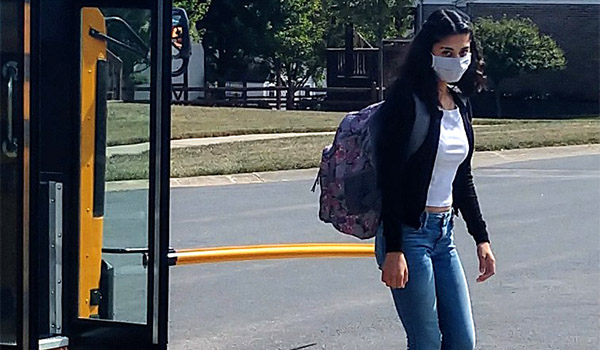
Family Forum / By Judy Konitzer: No doubt about it. We are living in a deeply altered world with a dramatic change in what is “normal.” Without a vaccine, and maybe even with one, COVID-19 may be here to stay indefinitely according to a growing consensus of scientists.

Masks, full-to-the-max back packs and social distancing before, during and after school are the daily norm for most students physically returning to school./ PERSONAL PHOTO CW4 (RET.) JOE PISANO
But as doctors improve treatments, and people embrace best practices like wearing a face mask, washing hands, and practicing social distancing, we are likely to see fewer cases with less severity. Of course, there are exceptions to this, and people with pre-existing conditions and the elderly are more vulnerable to grave illness and/or death. Interesting to note is COVID cases are rising among young adults, although seemingly milder, and once recovered they feel they can get into the world and resume life as usual.
The need to socialize and seek new experiences is “a neurobiological mandate” according to Judith G. Edersheim, founding co-director of the Massachusetts General Hospital for Law, Brain & Behavior and Assistant Professor of Psychiatry at Harvard Medical School. The development period from 14-26 when dopamine levels reach a lifetime peak is the time when motivation and reward driven learning drives them to value immediate gratification over future gains, which can lead to risky decisions. During this time, social environment and interactions with peers are important for brain development, mental health, and developing a sense of self. Lack of peer contact may interrupt this and might have long-term detrimental effects.
The pandemic is exacerbating these biological cravings when peer contacts, especially in schools, are limited, and while many will be returning to college campuses, many will not. Before COVID-19, young people showed rising rates of anxiety, depression, and suicide, which is seemingly making these existing problems worse and even creating new ones. Uncertainty around when the pandemic will end and what life will look like in the future is also causing distress. Studies show a relationship between unemployment and suicide, illicit drug use, and alcohol use with young adults being particularly vulnerable to those influences. On a positive note, the pandemic could also be teaching some young adults an important lesson that life is controllable and predictable given the right resources.
With tremendous controversy over the opening of elementary, middle, and high schools, it remains to be seen how this will continue to affect children and younger adults. When schools initially closed and students went to remote education, it became a learning curve for many families. It was not the traditional approach to “home schooling” already embraced by over 1 million families, but rather an emerging response which involved bringing school to the home. “Home schooling” is very difficult, demanding, and requires a lot of hard work, preparation, and time. It’s not for everyone, and even those who think it might be for them at this point may find out it is not. However, it is a reality, and there may not currently be a perfect answer with one size fitting all. We discovered this when asked to help “home school” our 7-year-old grandson living in Sydney, Australia. Our daughter and son-in-law were required to work from home when COVID appeared, and they had many work calls throughout the day. Jackson’s school had a very regimented program based on timelines, and their work interfered with these school times, so we did nightly (9 AM for him and 7 PM for us) 1 ½ hour Zoom classes to help. Jackson’s other grandparents in Australia did the same. It made us realize how fortunate our family was in being able to participate, but sad about so many millions of families who don’t have a support structure.
Truth be told we have reached a point where everyone needs to be an essential worker and children need to return to school, for the sake of the economy, for everyone’s psychological well-being, for peace, for unity, and for sanity. We can do this!
For those experiencing mental health challenges, some proven helplines are Military One Source 24/7 1-800-342-9647, Veterans Crisis Line 1-800-273-8255 Press 1, and TAPS www.taps.org/covid/together.
Judy Konitzer is the family forum editor for ARMY AVIATION; questions and suggestions can be directed to her at This email address is being protected from spambots. You need JavaScript enabled to view it..”>This email address is being protected from spambots. You need JavaScript enabled to view it..








